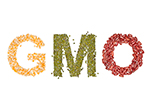
Combine gene editing and dairy cows and voila! You get hornless dairy cows. That may seem strange but it spares dairy farmers the cost of dehorning his cows, which prevents injuries to other cows. And lowering their cost means cheaper milk for us.
Other genetically modified organisms in agriculture also hold advantages: increased crop yields, disease resistance, enhanced nutrition, and drought resistance. The reality is we've been selecting for desirable traits in plants and animals for thousands of years through selective mating and breeding. Genetic engineering just made it easier and quicker.
For example, corn has been engineered to contain a bacterial protein which kills insects feeding on it. Now a new technology is allowing scientists to be even more specific.
Called CRISPR, it is part of the immune system of bacteria, and scientists discovered how to use it to edit genes. They can remove or inactivate problem genes, correct mutated genes, or even insert new genes.
CRISPR is pushing the boundaries of science by allowing researchers to edit human embryos in order to study genes important in human development. Imagine one day, correcting genetic disorders in babies while they're still embryos, but clearly we face ethical landmines as people may be tempted to design the perfect child.
Back to agriculture and CRISPR, this technology will only push us further up the road of genetically modified foods. In fact, the first genetically modified salmon was recently approved for consumption in the US. Happy dining!
More Information
Academies of Science Finds GMOs Not Harmful to Human Health
Genetically engineered crops are safe for humans and animals to eat and have not caused increases in cancer, obesity, gastrointestinal illnesses, kidney disease, autism or allergies, a report finds.
Why People Oppose GMOs Even Though Science Says They Are Safe
Intuition can encourage opinions that are contrary to the facts...
Human Gene Editing is About to Happen, But Don't Freak Out Just Yet
A British research team has gotten the go-ahead to edit the DNA of a human embryo using breakthrough tech that could cure cancer -- or bring on a comic-book-style mutant apocalypse.
The Heroes of CRISPR [PDF]
Three years ago, scientists reported that CRISPR technology can enable precise and efficient genome editing in living eukaryotic cells. Since then, the method has taken the scientific community by storm...